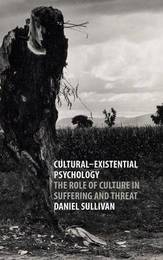
|
Cultural-Existential Psychology: The Role of Culture in Suffering and Threat
Hardback
Main Details
| Title |
Cultural-Existential Psychology: The Role of Culture in Suffering and Threat
|
| Authors and Contributors |
By (author) Daniel Sullivan
|
| Physical Properties |
| Format:Hardback | | Pages:314 | | Dimensions(mm): Height 229,Width 152 |
|
| Category/Genre | Phenomenology and Existentialism |
|---|
| ISBN/Barcode |
9781107096868
|
| Classifications | Dewey:150.192 |
|---|
| Audience | | Professional & Vocational | |
|---|
| Illustrations |
7 Tables, black and white; 3 Halftones, unspecified; 3 Halftones, black and white; 6 Line drawings, black and white
|
|
Publishing Details |
| Publisher |
Cambridge University Press
|
| Imprint |
Cambridge University Press
|
| Publication Date |
6 April 2016 |
| Publication Country |
United Kingdom
|
Description
Cultural psychology and experimental existential psychology are two of the fastest-growing movements in social psychology. In this book, Daniel Sullivan combines both perspectives to present a groundbreaking analysis of culture's role in shaping the psychology of threat experience. The first part of the book presents a new theoretical framework guided by three central principles: that humans are in a unique existential situation because we possess symbolic consciousness and culture; that culture provides psychological protection against threatening experiences, but also helps to create them; and that interdisciplinary methods are vital to understanding the link between culture and threat. In the second part of the book, Sullivan presents a novel program of research guided by these principles. Focusing on a case study of a traditionalist group of Mennonites in the midwestern United States, Sullivan examines the relationship between religion, community, guilt, anxiety, and the experience of natural disaster.
Author Biography
Daniel Sullivan is an Assistant Professor in the Psychology Department at the University of Arizona, Tucson. He is the author of several articles and book chapters on topics in experimental existential psychology, including terror management theory, enemy relations and conspiracy theories, and interpretations of suffering and victimhood. He has also written on film and literature, and is the co-editor of Death in Classic and Contemporary Film: Fade to Black (with Jeff Greenberg, 2013).
Reviews'With this book, we welcome in an exciting new field of cultural-existential psychology that is not only deeply theoretical but supported by innovative research by the author. It should be of broad interest across disciplines and is a must-read for any scholar or practitioner interested in the study of culture.' Michele Gelfand, University of Maryland 'We would describe Sullivan's efforts as highly ambitious and insightful. Due to the salience that American politics and the associated culture clash have recently enjoyed, there is a possibility that we are, in part, prisoners of the moment, but we think not. Sullivan is clearly on to something in his attempt to bring an appreciation of culture and cultural differences to the study of the ways in which individuals deal with suffering and threat. For the betterment of psychological science as well as our own conscience, we hope that he continues to integrate these important areas of research.' William L. Dunlop and Calen Horton, PsycCRITIQUES
|